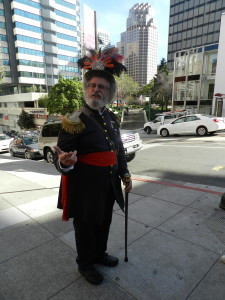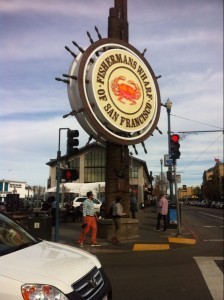Amanda Roberts's Blog, page 20
March 15, 2015
Two Americans in China in Chinatown
One of the main reasons we wanted to visit San Francisco was to visit Chinatown. I know, we live in China and we wanted to go to Chinatown? Why not? We love Chinese people and Chinese culture no matter where in the world it is, and we thought it would be interesting to learn more about the history of the Chinese in America. Zoe found it especially fascinating.
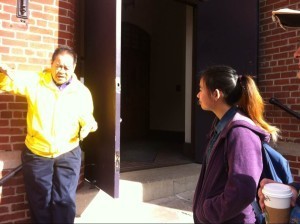
Zoe and our tour guide, Dave.
Even though Chinatowns can be found all over the world, San Francisco’s Chinatown is the largest Chinese diaspora in the world and is the oldest Chinese community in America. We went on a tour of the area with Dave, a man born and raised in Chinatown, through All About Chinatown Walking Tours. There are many Chinatown tour companies in San Francisco, but I would recommend this one because the tour was small (only us three and another couple) and the tour guides are from Chinatown, so they really know the history and culture of the area. The Chinatown of today is very different than it was 150 years ago. It has actually moved several times and was completely destroyed by the earthquake and fire of 1906.
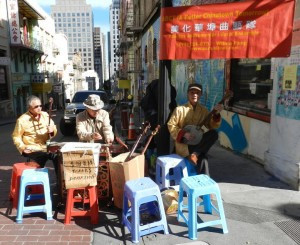 In some ways, Chinatown is really like China, so it felt like we weren’t back in America just yet. The street food, the vegetable market, the pharmacies, the group playing traditional Chinese instruments, and, of course, the languages, all tried to fool our senses into thinking we were back home.
In some ways, Chinatown is really like China, so it felt like we weren’t back in America just yet. The street food, the vegetable market, the pharmacies, the group playing traditional Chinese instruments, and, of course, the languages, all tried to fool our senses into thinking we were back home.
There are gorgeous murals painted on almost every wall. We didn’t do any shopping because almost everything we found in the shops you can get much cheaper on Taobao or in any shop in China.
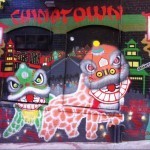



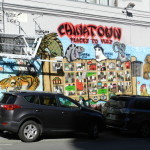
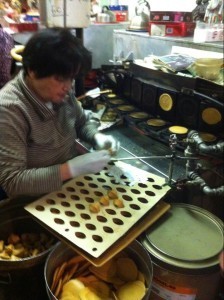 We went to the famous fortune cookie factory to see “the little old ladies making cookies,” but don’t worry, your fortune cookies aren’t really made by slave laborers in San Francisco. The fortune cookie factory there is just for tourists. The actual fortune cookie factory is several miles away and produces thousands of fortune cookies a day on big machines.
We went to the famous fortune cookie factory to see “the little old ladies making cookies,” but don’t worry, your fortune cookies aren’t really made by slave laborers in San Francisco. The fortune cookie factory there is just for tourists. The actual fortune cookie factory is several miles away and produces thousands of fortune cookies a day on big machines.
I was surprised to see how active Falun Gong members were in the area. They were handing out pamphlets on nearly every street corner and had tables set up and even loudspeakers. There were also anti-government groups trying to get attention. 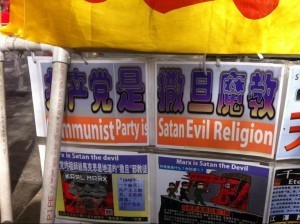
The Chinese in San Francisco have made great progress. The city has its first Chinese mayor and Chinese culture is celebrated. However, I did notice that, even in other areas of the city, the Chinese make up a significant portion of the labor class. This isn’t something that I have had much opportunity to research since my focus is on the Chinese in China, but this observation did concern me and I would like to know more about the current status of the Chinese in San Francisco.
What about you? Have you been to San Fran’s Chinatown? What did you think? I would love to hear your experiences.
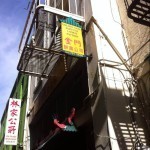
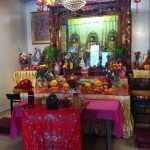



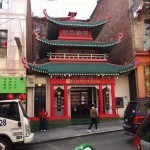
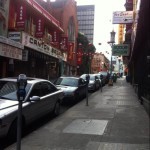
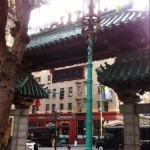
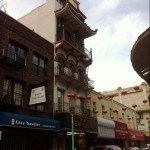
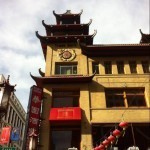
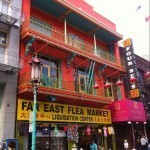
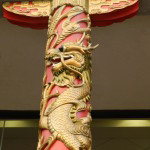

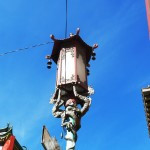
March 9, 2015
Two Americans in China in San Francisco
Ack! I can’t believe how long it has been since I last posted! I planned on doing posts while I was on vacation, but time just got away from me and the Internet at my in-laws house was terrible, so I hardly spent any time online. Anyway, here is how we spent our Chinese New Year!
After many years of saying we would, we finally were able to take Zoe to America! It was her first time out of the country (well, she has been to Macau and Hong Kong, but…you know…Hong Kong is China) and her first time flying. It was an exciting trip for her, mainly because we didn’t tell her any of our plans, so she had no idea what to expect from day to day. She will be sharing her reflections on the trip later. (Be sure to click on all the images for captions!)

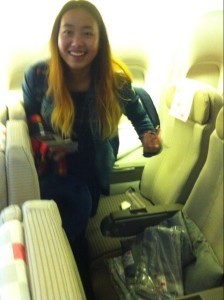
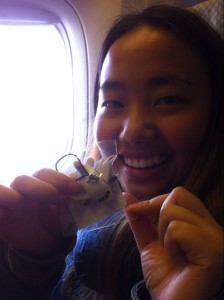
My husband and I live in Florida, but we always layover in California. We had never been to San Francisco before and always wanted to go, so we arranged a long layover in San Francisco.
San Francisco is a very cool and interesting place. Honestly, while we were there, it didn’t feel like we were back in America – it felt like Hong Kong. The city is so crowded! Not just the downtown area, but the whole city is just wall-to-wall buildings. I’ve never been in another American city like it.
We did all the touristy things. Instead of going to Alcatraz and the Golden Gate Bridge individually, though, we took a bay cruise that went by both of them. It was a lot of fun.



We saw the famous sealions, but they were backlit when we went to see them so the pics didn’t turn out very well.
We went on a historical tour of the city with Emperor Norton!
Emperor Norton was, at one time, a successful businessman. After going bankrupt, though, he declared himself the first Emperor of America and became a popular local in San Francisco. When he died in 1880, over 30,000 people attended his funeral. He now gives tours twice a week of his beloved city. If you are ever in San Francisco and want to learn more about this fascinating city, definately go on one of his tours.
We went to Fisherman’s Warf…
where we found a really kitschy museum called Musée Mécanique that is home to hundreds of old mechanical arcade machines. The machines are all in working order, and for a quarter or two you can play a game, have your fortune told, watch a scene, or look at bawdy pictures. I thought one featuring a Chinese opium den was very interesting.
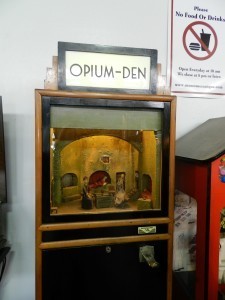


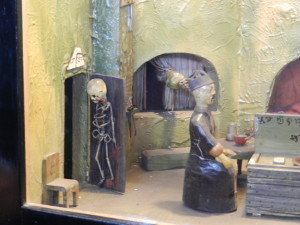
Seth and Zoe enjoyed seeing who could be “electrocuted” the longest.
Of course, the main reason we went to San Francisco was to visit Chinatown, but that is a post for tomorrow!
February 9, 2015
China – Not As Safe As You Think
In the past, when people have asked me “is China safe?” I have answered “yes.” And most people would agree. In fact, if you Google “is China safe?” you will find plenty of forums that tout the safety of China, even for women. Yet I have been seeing more and more incidents of Western women assaulted in China and have experienced it myself. The truth is no country is “safe.” Assault can and does happen everywhere. It might happen more frequently in other countries, but that doesn’t mean you can’t or won’t become a victim of assault. In fact, I believe that China is far more dangerous than people let on. Part of the problem is that not enough women speak out about it.
Chinese Women in China
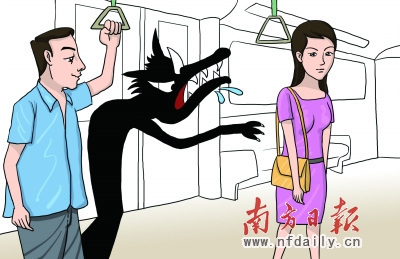 Let me clarify that yes, this article is mainly about the experiences of expat women in China and not local Chinese women or expat women of Chinese ethnicity. This is because China is extremely dangerous for Chinese women. China has some of the highest rape and domestic abuse rates in the world. In some studies, as many as 60% of women surveyed admitted to being abused by their partner and in other studies nearly 25% of men admit to raping a woman. Even in public, most people will not stop a man from assaulting a woman because they don’t want to get involved in a “domestic situation.” China doesn’t even have laws to protect women from domestic abuse. However, being a Chinese local and being a tourist or an expat are completely different experiences. Many times, expats are lured into a false sense of safety. And it is this false safety that has me concerned. I believe assault among expat women is much higher than we have been lead to believe.
Let me clarify that yes, this article is mainly about the experiences of expat women in China and not local Chinese women or expat women of Chinese ethnicity. This is because China is extremely dangerous for Chinese women. China has some of the highest rape and domestic abuse rates in the world. In some studies, as many as 60% of women surveyed admitted to being abused by their partner and in other studies nearly 25% of men admit to raping a woman. Even in public, most people will not stop a man from assaulting a woman because they don’t want to get involved in a “domestic situation.” China doesn’t even have laws to protect women from domestic abuse. However, being a Chinese local and being a tourist or an expat are completely different experiences. Many times, expats are lured into a false sense of safety. And it is this false safety that has me concerned. I believe assault among expat women is much higher than we have been lead to believe.
Expat Women Assaulted by Chinese Men
I’ve actually been wanting to write this post for a long time. Late last year, Jocelyn Eikenburg at Speaking of China wrote about the time she was sexually assaulted by a Beijing private driver and the way she is constantly street harassed. She says,
It happened in Beijing when a driver a friend arranged to send me to the airport ended up touching one of my breasts. He did it just before I was about to leave his car – as if he had wanted to touch me the entire time and held out for the right moment. It was creepy and despicable and the kind of thing I hope will never happen again.
She also says
Years ago, I often told friends how I would walk through Shanghai late into the evenings and never feel worried about getting raped or jumped by anyone.
But now I wonder if I really had it right or not. Was I safe in Shanghai because we lived in the center of the city, where lots of people streamed through the streets day and night? Or was I simply naïve?
Unfortunately, I think she, like me, was simply naïve. A large reason is because, as she also says “I’ve not wanted to share it for a long time – believing, as she did, that somehow it was all my fault.”
When women don’t share their stories, the stories simply pile up. If you read the comments, you will see many, many more stories about assault, harassment, and stalking.
There is an extremely frightening account by Zhou JiaYi on her blog Shandongxifu about her assault by three men in Shenzhen.
I reactively swatted his hand away and looked the man in horror. The men smiled. I was feisty.
I started forward but was detained. The other men had grabbed my arms and my attempts to get away only brought them forward with me. Panic rushed through me. I momentarily looked around at the passersby who watched me with curiosity and pity. I had been in China before and I knew that no one would ever help a stranger; They would simply stop and watch. I had been in Shenzhen long enough to know that the police wouldn’t help, even if I had happened to see one in that very second. I was scared.
I fought against the three men as they started to pull me away out the crowds, move their hands towards forbidden places, and start to tear at buttons on my dress.
You should really read the whole post. She doesn’t say when exactly the incident happened, but it is clear that a considerable amount of time passed between the assault and when she finally worked up the courage to write about it. Once again, she stayed silent while everyone else went along thinking China was totally safe.
My Experiences with Assault and Harassment
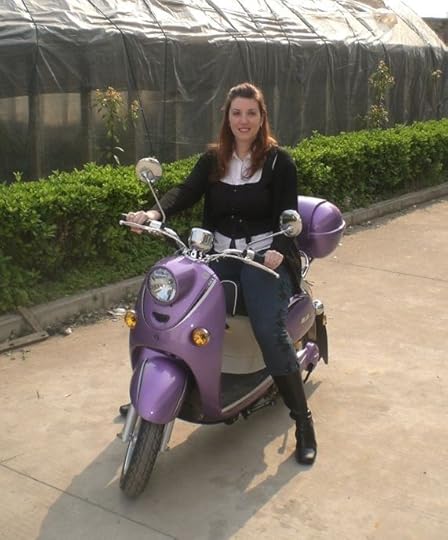 I’ve never been sexually assaulted in China, but I have been assaulted, and I’ve written about it before.
I’ve never been sexually assaulted in China, but I have been assaulted, and I’ve written about it before.
Thankfully, nothing like this has happened to me since, but I still feel panicky when I think about it.
Most recently, I have been at the forefront of fighting harassment here in Shenzhen. There is a Chinese man who calls himself Nathan but I call The Shenzhen Creeper who has been harassing and stalking expat women in Shenzhen for over a year. He is the reason we had to turn the Shenzhen Writers Circle into Women Writers of Shenzhen. The women in the group simply didn’t feel safe with him in our community. Whenever a new expat woman would join our group (only expat women; he has never stalked a Chinese member of our group), he would get their WeChat (like China’s Facebook and instant messenger) and their email address and continually message them. Most of the messages may seem harmless enough, asking if the women want to get coffee or go to a movie, but several of them have been creepy, asking where the women live, work, or go to the gym. He has sent long love songs to women and asked if they “see themselves” in his love poems. I should also mention that Creeper is married and has a one-year-old daughter.
Most of the women simply tried to ignore him, say they were too busy, and stop attending events. But the messages never stop. Several of the women have told him directly to stop messaging them, but he hasn’t. I confronted him about his behavior, but he denied that he was doing anything wrong and has claimed that he is the victim of gross mischaracterization and persecution by me.
Many people may think a few messages are “no big deal,” but from a woman’s perspective, any unwanted attention can be seen as threatening. And Creeper has reacted with verbal and emotional violence. He has threatened to have me arrested, sued, and has threatened my employer. He has even threatened my guy friends who have stood up for me, telling them that they would also end up in court if they take my side. The women are not unreasonable in their fears that Creeper could escalate things if they were to outright reject him. Even though he was ejected from the writers group, he still finds ways to contact our members occasionally. He has also found other social groups that have large numbers of expat women and has been stalking their members.
Speaking Out
I am not saying that the onus of stopping assaults and harassment in China is on the victims. However, if women don’t speak out about their experiences, many more women could be hurt by this false belief that “China is safe.” There is no shame in speaking out if you have been a victim of abuse. And no longer should people stick their head in the sand and pretend that assault in China doesn’t happen. If you have been assaulted, speak out. If you know that someone is being assaulted or harassed, speak out against it. Everyone must work together to stop abuse.
February 2, 2015
Frog by Mo Yan – Book Review
Talk about disappointing. Two years ago, when Mo Yan won the Nobel Prize for literature for Frog, Westerners and Chinese were shocked and elated. The Chinese were ecstatic that a Chinese writer won the honor at all (he’s the only Chinese writer who lives in China to have ever won the prize) and Westerners were amazed that the book was “about the one-child policy and forced abortions.” Unfortunately for people who can’t read Chinese, that description was a bit of a misnomer. After waiting two years for the official English translation of Frog, I can tell you that there is nothing surprising, shocking, or reactionary in Mo Yan’s Frog. In fact, Frog toes the party line just like every other Chinese writer trapped in China (though I don’t think Mo is actually trapped and rather enjoys his role as an exemplary Party member).
 Many reviewers claim that the book is about a woman named Gugu, a midwife, obstetrician, and abortionist in China from the 1960s to the present day, but that isn’t actually true. The book is about Tadpole, the book’s male narrator and Gugu’s nephew. Gugu does have a large role in the book, but she is not the protagonist, and large swathes of the book leave her out entirely.
Many reviewers claim that the book is about a woman named Gugu, a midwife, obstetrician, and abortionist in China from the 1960s to the present day, but that isn’t actually true. The book is about Tadpole, the book’s male narrator and Gugu’s nephew. Gugu does have a large role in the book, but she is not the protagonist, and large swathes of the book leave her out entirely.
The book opens on the Great Chinese Famine from the late 50s to the early 60s. The narrator and his classmates are so hungry, they eat coal. While this is most likely based on true events, the scene is humorous and contains none of the horrors that people endured during the Great Famine. Everyone who was alive at the beginning of Mo’s book is still alive after the famine, even though as many as 40 million people died during that time, including whole communes. At one point, Tadpole says that he would “have rather starved than eat a frog.” This seems to imply that the famine wasn’t so bad if people could still be picky about what they would and wouldn’t eat to survive. The truth is that some people ate their own children in order to survive the famine. But Mo’s lighthearted approach to one of the most tragic parts of China’s history sets the tone of the novel.
The book finally moves into the family planning stories and recounts the deaths of two women who are trying to have second children, but the narrative is extremely sloppy and paltry. The first family planning policy stated, “one is good, two is just right, three is too many” and forced vasectomies became the norm. Forced vasectomies certainly did happen in frightening numbers, but they are rarely talked about. They also don’t happen today, unlike forced abortions. But then the book jumps 20 years into the future when the one-child policy is in full effect with no explanation or introduction.
None of the women in the book are “forced” to have an abortion. One woman (Tadpole’s first wife) is “coerced” (Gugu begins tearing down the neighbor’s houses and the woman eventually gives in) and the other one gives birth prematurely while trying to escape from Gugu. These are also only two women. The fact that countless women (even today) have been dragged out of their homes and strapped down while their wanted babies are ripped from their bodies is completely left out. While the deaths of the two women who have abortions are sad, and the ramifications are felt throughout the rest of the book, the deaths are just not particularly significant. I’m not sure if that the right word, but if you feel horrified, disgusted, or heartbroken over their deaths, you really are not very well-informed about what women have been enduring in China since the one-child policy came into effect over 30 years ago.
But more frustrating than the way Mo handles the one-child policy and the women’s deaths is how he completely dissolves the Chinese government, the family planning commission, and even Gugu of any responsibility. He says “Westerner’s critiques of China’s family planning policies are unfair;” “I wasn’t blaming [Gugu]…it was just our fate;” “Society didn’t create my problem; I was the problem;” “The men and women who defied the policy against multiple pregnancies could not escape a share of the responsibility for what happened;” and “Family planning has an impact on the national economy and the people’s livelihood, and it is the greatest importance.”
Oh sure, there are some nice feminist statements littered throughout the book, such as “his head was filled with feudal ideas like favouring boys over girls” and “I want them to know how hard it is to be a woman,” but in the end, the book holds up the old status quo. At 55-years of age, Tadpole becomes a father to a son, and even though he has a wonderful daughter living abroad, he says that his son “is a treasure sent down to me from the heavens, and is worth all my suffering.” See, as long as you have a son, it doesn’t matter how many women died or how many kids were aborted or how many filial daughters you have, having a son makes everything all right!
This book is beyond disappointing, it is infuriating. I honestly don’t know why it won the Nobel Prize. The book does nothing to challenge preconceived notions, is not original, and isn’t even honest. There are so many books out there that are so much better. In fact, I’d go as far as to say that the selection of Mo Yan as a winner is a downright sexist decision. The book largely deals with women’s issues but is told by a man from a man’s perspective. And while men can write about women’s issues and be allies, why have Chinese female writers who have also talked about these issues with much more candor, honesty, and emotion been snubbed? Authors like Xinran and Lisa See have both written brilliantly and openly about women’s experiences in China because they have the freedom to do so by living overseas.
Mo Yan is nothing more than a communist party mouthpiece, and as long as the Chinese government continues to pursue policies of censorship and artistic strangleholds, this is the best Chinese authors will be able to give the world. Mo Yan’s Frog is an excellent example of why Chinese authors in China shouldn’t and don’t win Nobel Prizes.
Have you read Frog? Let me know what you thought in the comments.
January 27, 2015
An Open Letter to Victoria Thompson, Author of the Gaslight Mystery Series
Dear Ms. Thompson,
Every day, women are told that they can only ever be truly happy if they give birth to a child. It is everywhere – from our own mothers, to politicians, to religious leaders, to books, movies, and TV shows. No matter what else a woman has in her life, no matter how many kids she may have through adoption or marriage, no matter whether she might not even want kids, the idea that women can only know true happiness by forcing another human being out through her vagina is force-fed to us every day.
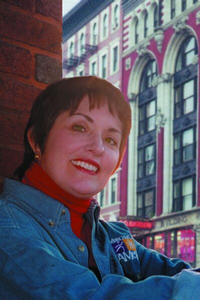 I started reading your Gaslight Mysteries series for lots of reasons. I actually read Murder in Chinatown first because, obviously, China and Chinese people are particular interests of mine. I really loved it, again for many reasons. I love the setting. I love the mysteries. I love the romance. I love how you have created a realistic Victorian heroine with a job other than lady or whore. So I started to read the series from the beginning this year. I read the first 15 books in about 8 weeks.
I started reading your Gaslight Mysteries series for lots of reasons. I actually read Murder in Chinatown first because, obviously, China and Chinese people are particular interests of mine. I really loved it, again for many reasons. I love the setting. I love the mysteries. I love the romance. I love how you have created a realistic Victorian heroine with a job other than lady or whore. So I started to read the series from the beginning this year. I read the first 15 books in about 8 weeks.
I mainly love how the protagonist, Sarah Brandt, has an adopted daughter. Even though gaining a child through adoption was not Sarah’s dream, it was simply meant to be. She loves Catherine as her own, as all adoptive mothers do.
About book 13, though, I really started getting nervous. Like, really nervous. I was anxious and frustrated and almost angry. I wanted to skip books 13 and 14 and read 15, Murder in Chelsea, just to know what happened to Catherine. Obviously, the arch of the book was heading toward Detective Sargent Malloy and Sarah getting married (that’s not a spoiler, that’s just the trajectory of the series). The book was also heading toward solving the mystery of Catherine’s past. But if they found out who she was, most likely they would find out who her family was. Most likely, that would mean Sarah losing Catherine because no matter who they were, legally, they were her family.
I can honestly say that I was sick with worry that your series was going to follow the same trope as millions of others: Sarah was going to lose Catherine, marry Malloy, have a baby of her own, and discover true happiness.
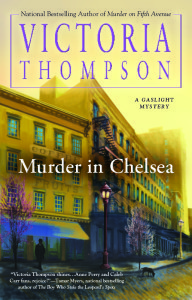 I almost feel I owe you an apology for thinking so poorly of you. By the end of Murder in Chelsea, I was nearly in tears. The only thing stopping me was my husband looking at me as if I had grown two heads. I gave him a quick explanation of what happened (I think I failed in summing up all 15 books in two sentences), but I am still not sure he quite understood what your denouement of this plot arch meant, and still means, to me.
I almost feel I owe you an apology for thinking so poorly of you. By the end of Murder in Chelsea, I was nearly in tears. The only thing stopping me was my husband looking at me as if I had grown two heads. I gave him a quick explanation of what happened (I think I failed in summing up all 15 books in two sentences), but I am still not sure he quite understood what your denouement of this plot arch meant, and still means, to me.
But I hope you do.
Every day, women without birth children are made to feel less-than, and we are sorely underrepresented in media (and this is in an area where women in general are underrepresented). I just want to thank you for your lovely series and for including non-traditional women and families in your books. As an aspiring mystery writer myself, I can only hope to live up to a fraction of what you have accomplished. I have even thought of enrolling in the writing popular fiction program at Seton Hill University just so I can learn from you directly. Maybe someday.
Sincerely,
Amanda R.
January 26, 2015
Chinese-Americans vs. American-Born Chinese
If you’ve never been to China, you probably haven’t heard the term “American-Born Chinese.” It is a uniquely Chinese phrase used to identify people who live in China of Chinese ethnicity but were born abroad, often truncated as ABC (or BBC for British-born Chinese or CBC for Canadian-born Chinese, and so on).
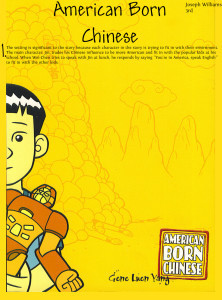 In America, we don’t have a quite equal phrase, but we do have something similar, Chinese-American, used to identify American citizens of Chinese ethnicity. Every ethnicity in America can use a hyphenated identity if they wish (African-American, Indian-American, etc.). I’ve been wondering why China and America seem to have opposite views on identity, race, and nationality.
In America, we don’t have a quite equal phrase, but we do have something similar, Chinese-American, used to identify American citizens of Chinese ethnicity. Every ethnicity in America can use a hyphenated identity if they wish (African-American, Indian-American, etc.). I’ve been wondering why China and America seem to have opposite views on identity, race, and nationality.
GRAMMAR TIME! In the phrase “American-born Chinese,” “American-born” is the adjective and “Chinese” is the noun. An adjective describes a noun and is typically unnecessary information. in the phrase “Chinese-American,” the ethnicity is the adjective and the nationality is the noun. So what is the difference?
To me, this shows a big difference in how Chinese and Americans emphasize race.
For Americans, the ethnicity is less important than the nationality. It doesn’t matter what your race is or where you are from, if you are an American citizen, you are an American. You can choose to hyphenate your ethnicity as a sign of respect to your heritage, but you don’t have to. The most important thing is that you are American,
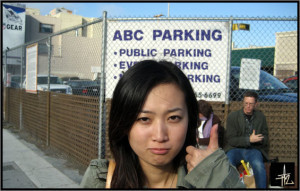 In China, your ethnicity is more important than your nationality (though many Chinese also don’t see a difference between being ethnically Chinese and nationally Chinese). To many Chinese, no matter where you are from, where you were born, or where you may live, you are always Chinese first. Last year, during election season in the US, Chinese officials praised the increasing numbers of Chinese-Americans running in American political races because their success is China’s success (I scoured the Internet to find those articles, but I couldn’t find them anywhere! But I know I read them! If you know what articles I’m talking about, please link them in the comments).
In China, your ethnicity is more important than your nationality (though many Chinese also don’t see a difference between being ethnically Chinese and nationally Chinese). To many Chinese, no matter where you are from, where you were born, or where you may live, you are always Chinese first. Last year, during election season in the US, Chinese officials praised the increasing numbers of Chinese-Americans running in American political races because their success is China’s success (I scoured the Internet to find those articles, but I couldn’t find them anywhere! But I know I read them! If you know what articles I’m talking about, please link them in the comments).
This has made me wonder what our daughters will be. They will be born in China, but American citizens with American parents, but live in China. Will they be CBCA? Chinese-born Chinese-Americans?
What do you think? Are you an ABC or a Chinese-American? Does it matter? Am I over-thinking this?
January 20, 2015
I Am Not Charlie
Last week, the opinion page editor sent me an opinion article and asked me “should we print this?” I thought it was a strange request since what the paper does and doesn’t print isn’t up to me. However, when I discovered that the article was basically about how Americans are hypocritical in how they use freedom of speech, and 80% of our readers are expats, I realized why they asked my opinion.
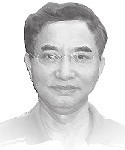
Wu Guangqiang
The article by Wu Guangqiang, one of our regular contributors, was not very good 1) because for a Chinese writer to criticize freedom of speech in the west in a Chinese newspaper is rather hypocritical in and of itself, and 2) since the Chinese writer (and the Chinese media) doesn’t have freedom of speech, he really didn’t know what he was talking about.
I told the editor, though, that as a proponent of freedom of speech, I couldn’t say “don’t run this piece;” everyone should have the right to say whatever they want. But, as a newspaper, I did think it was important for the paper to run op-eds by people whose opinions are based in fact, so if the paper was going to run the piece, they should probably suggest some edits.
Instead what they decided to do was run Wu’s original article (analyzing freedom of speech from a Chinese perspective) and then have me write a complementary piece (analyzing freedom of speech from a Western perspective). I still didn’t think this was the best idea – Wu should have written a piece analyzing freedom of speech in China – I decided to take what I could get.
I have shared my article, “I Am Not Charlie,” below in full, but I would highly encourage you to read Wu Guangqiang’s article, “Free Speech vs. Mutual Respect,” first.
I Am Not Charlie
 AS a person who works in media, I have had more than one person ask me how I feel about the Charlie Hebdo attacks in Paris, France, and many have been surprised that I haven’t taken up the “Je suis Charlie” slogan. As a proponent of free speech, I wish the world had chosen a different slogan to show their support for the fallen writers because even though I support their right to say whatever they want, I do not support the world outlook of the writers of Charlie Hebdo.
AS a person who works in media, I have had more than one person ask me how I feel about the Charlie Hebdo attacks in Paris, France, and many have been surprised that I haven’t taken up the “Je suis Charlie” slogan. As a proponent of free speech, I wish the world had chosen a different slogan to show their support for the fallen writers because even though I support their right to say whatever they want, I do not support the world outlook of the writers of Charlie Hebdo.
Let me clarify that I am an American. As such, I don’t speak for all Westerners in how they view or carry out “freedom of speech.” Not all Westerners are the same any more than all Asians are.
What is freedom of speech? I feel the need to explain this because, in all honesty, most people do not understand what “freedom of speech” actually is. In America, freedom of speech is guaranteed by the first amendment to our constitution. It states, “Congress shall make no law respecting an establishment of religion, or prohibiting the free exercise thereof; or abridging the freedom of speech, or of the press; or the right of the people peaceably to assemble, and to petition the Government for a redress of grievances.” Please note how the amendment states, “Congress shall make no law” — that is important.
In America, the government is not allowed to infringe on your right to say nearly whatever you want. However, it does not protect you from the consequences of saying stupid things. For example, if a restaurant owner was to state publicly that he thinks all Asian people are genetically inferior to whites, I have the right to not agree with him. I have the right not to eat at his restaurant. I have the right to disagree with him and even rally protests against his business. If his business should close because no one eats at his restaurant anymore, I would be very happy. Freedom of speech and capitalism walk hand-in-hand. Even though the restaurant owner suffered for using freedom of speech, his rights were not infringed upon because the government was never involved.
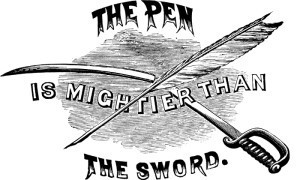 This is why I am not Charlie. Charlie Hebdo was known for publishing racist cartoons, something I don’t support. I would never write the things that Charlie Hebdo wrote. I would never buy their magazine. I would never visit their website. I would never forward their cartoons. If Charlie Hebdo were to shut down for lack of support, I would have no problem with that. I don’t believe Charlie Hebdo should say and publish the things that they do.
This is why I am not Charlie. Charlie Hebdo was known for publishing racist cartoons, something I don’t support. I would never write the things that Charlie Hebdo wrote. I would never buy their magazine. I would never visit their website. I would never forward their cartoons. If Charlie Hebdo were to shut down for lack of support, I would have no problem with that. I don’t believe Charlie Hebdo should say and publish the things that they do.
However, I will always support their right to say and publish whatever they want. Every person in the world should have the right to believe and say what they want without government interference.
The only exception to this is hate speech. By American law, “hate speech is any speech, gesture or conduct, writing, or display which is forbidden because it may incite violence or prejudicial action against or by a protected individual or group, or because it disparages or intimidates a protected individual or group.” Hate speech goes beyond speech. Hate speech is usually specifically used to incite violence and endangers people’s lives.
Let’s take our restaurant owner for example. He has the right to believe and say that he is against Asians, but if he says that Asians should be dragged out of their homes and shot in the street, then the government should step in to stop him because his words could incite someone to cause bodily harm to another person. This is not a violation of freedom of speech, but is a protection of Asians’ lives.
What about politically correct speech? Politically correct speech is “an attitude or policy of being careful not to offend or upset any group of people in society who are believed to have a disadvantage.” Politically correct speech shows respect for marginalized groups. For example, I don’t use the n-word because I respect all black people. But there is no law that says I can’t use the n-word. I wouldn’t be arrested for using the n-word. I wouldn’t have my Facebook page shut down for using the n-word. Freedom of speech and politically correct speech actually have nothing to do with one another because freedom of speech is guaranteed by the government while politically correct speech is used by individuals to show respect for others.
Freedom of speech is a complicated issue, one wrapped in hundreds of years of history that is intrinsically related to capitalism. It is terrible that so many people in the world are still denied this basic human right and are even killed for exercising it. I am not Charlie Hebdo, but everyone should have the right to be.
January 19, 2015
Conversations on Adoption – Unwanted Advice
My boss was kind enough to surprise me and the other American copy editor at the newspaper with a Christmas lunch a couple of weeks ago. As usual, I get asked why I don’t have kids. The question “why don’t you have kids” is something I am asked almost daily in China. In China, it is a given that people who are married have a kid, usually within the first year of marriage. Anyone outside of this norm is weird, local or not.
Personally, I find the question “why don’t you have kids” invasive and down right offensive. It is no one’s business why I don’t have kids. And the actual reasons are complicated and rather painful, reasons I’m not going to share with strangers. Some of the reasons my own parents don’t know and I wouldn’t even tell my BFF. And don’t come at me with “oh, invasive questions are just Chinese culture.” Don’t care. It’s still rude and still very painful.
I replied with my usual, “Well, we are hoping to adopt here in China instead.” My boss replied with a whole bunch of unsolicited advice. “Oh, well adoption is very difficult.” “You know, it is so expensive.” “It can be very hard to raise an adopted child.”
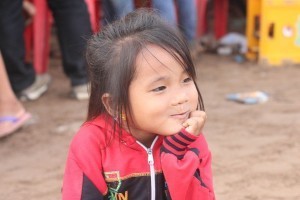 I start tuning him out at this point and just nod because the only answer I want to give is “I KNOW!” But I can’t because he’s my boss and he is actually a really nice guy.
I start tuning him out at this point and just nod because the only answer I want to give is “I KNOW!” But I can’t because he’s my boss and he is actually a really nice guy.
But I’m the one who has been on the adoption journey for more than a decade. I’m the one who moved to China to achieve this goal. I’m the one who works 4 jobs to make this happen. I’m the one who reads countless articles on adoption every single day. I don’t want or need adoption advice from someone who has never even considered it.
Unless you have adopted/ have been adopted and are asked for your advice, do not offer advice on adoption to adoptive families. This goes for people anywhere in the world. Even if you have adopted, the adoption process is different for every family and offering unasked for advice can actually cause more harm than good.
If you want to know more about adoption, feel free to ask questions. I’m sure many adoptive families are more than willing to share parts of their journey with you.
What about you? How do you deal with unsolicited advice? Not just on adoption, but parenting in general?
January 15, 2015
Throwback Thursday – On the Li River
Yangshuo, Guangxi Autonomous Region, about an hour from Guilin, is one of the most beautiful towns in China. We spent about a week there when we first came to China since that is where the Buckland Training Center is located. We’ve been there twice since. There are so many beautiful and interesting places to visit in China, but we lost our hearts in Yangshuo, so we love going back there.
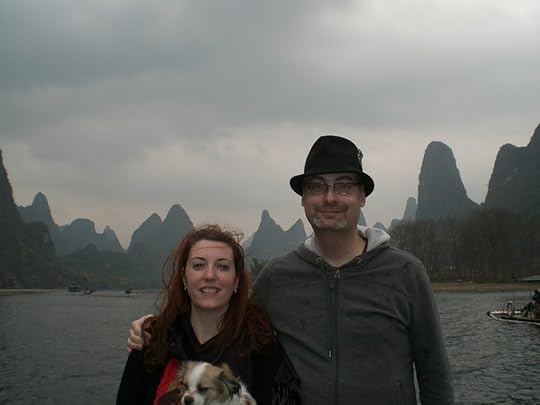 Yangshuo is a great blend of old and new, East and West, country and comfort. It’s a small town with lots of expats, so many people speak English and there are lots of local and international restaurants. The countryside is gorgeous and there are lots of outdoor activities. The hostels are really affordable and are typically just outside of town in renovated village houses. If you haven’t been, I would highly recomend it.
Yangshuo is a great blend of old and new, East and West, country and comfort. It’s a small town with lots of expats, so many people speak English and there are lots of local and international restaurants. The countryside is gorgeous and there are lots of outdoor activities. The hostels are really affordable and are typically just outside of town in renovated village houses. If you haven’t been, I would highly recomend it.
The only problem with Yangshuo is that it is a bit out of the way. It was about a 14-hour train ride from both Changsha and Shenzhen, so we haven’t been back in a while. The last time we went, we took a train for 14 hours, stayed in Guilin for a night, and the next day took a river boat down the Li River to Yangshuo. That was a lot of fun.
But as of December, there is now a fast train going directly from Shenzhen to Yangshuo, cutting the trip down to about 4 hours. After our America trip, we are hoping to be able to take some weekend trips to this beautiful town.
What about you? What are some of your favorite places in China to visit?
January 12, 2015
Conversations on Adoption in China
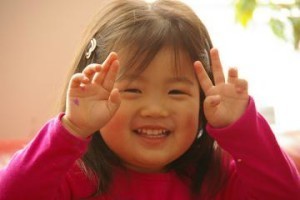 While walking to the subway with two of my coworkers yesterday, I had the following conversation:
While walking to the subway with two of my coworkers yesterday, I had the following conversation:
Sarah: Why do you live in China instead of Thailand?
Me: Well, my husband and I are planning on adopting here in China.
Sarah: Oh, is that very difficult for foreigners?
Me: Yes. It is very difficult. It takes a long time and is very expensive.
Julie: It’s like buying children.
Me: *eye-roll*
Sarah: In China, we don’t understand why someone would want to raise someone else’s child.
Me: Well, it is just a different way of thinking. I wouldn’t be raising someone else’s child. I would be raising my child.
Sarah: I asked my mom once what she thought about adoption. She said, ‘well, you can discipline your own child. You can’t discipline an adopted child.’ Well, I go this way now. Bye!
Me: *left speechless*
I’ve actually had several conversations like this with Chinese friends and co-workers. In China, adoption simply isn’t common and isn’t widely accepted. While I would love to raise my kids here in China for at least a few years, these kinds of micro-agressions are worrisome. I want to give my kids the best life possible, not make them unnecessary objects of fascination or ridicule. Our goddaughter Zoe is actually very worried about our daughters attending local schools since their classmates won’t have any understanding about adoption and might make fun of them. While they most likely will be teased and face racism no matter where we live in the world, I am worried about raising them in a place where they are isolated, where there are no other adopted kids for them to talk to and share their experiences. I know I am not going to be a perfect parent, and I’m going to make mistakes, but I want to make sure my mistakes aren’t excessive.
I’m a worrier, though. Even though it will still be a year or more before our first daughter comes home, these are the kinds of things I worry about a lot. What about you? Have you had conversations with locals about adoption? What have your experiences been?


